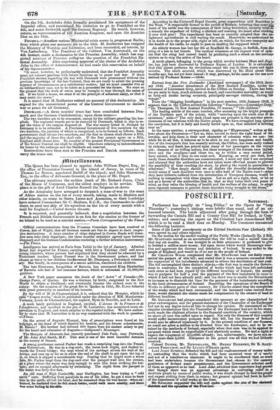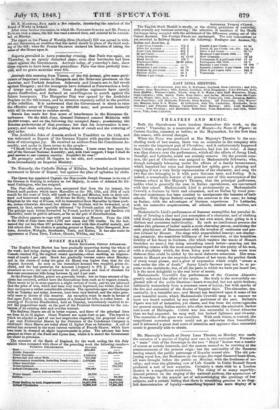POSTSCRIPT.
SATURDAY .
Parliament has usually its "long Friday," as the Opera its "long Thursday ": yesterday's sittings were briefer than usual, and of an ex-
hausted interest. The Lords adjourned after going through the form of forwarding the Canada Bill and a County Cess Bill for Ireland, in Com- mittee; and receiving the report op the Criminal Law Amendment Dm, which is to be read a. third time on Monday. The Commons transacted the following business.
Some of the Lords' amendments on the Evicted Destitute Poor (Ireland) Bill were agreed to, and others rejected. On the motion for the second reading of the Public Works (Ireland) No. 2 Bill, Mr. STAFFORD moved as an amendment that the bill be read a second time an that day six months. It was brought in on false pretences: it professed to give to Ireland a million more money, but upon terms which would discourage exer- tion and aggravate the distress and desolation of Ireland. It was pillar to the people of England, and would be of no use to the people of Ireland.
Sir CHART FA WOOD complained that Mr. STAFVORD had not fairly repre- sented the purport of this bill; and stated that it was a measure connected with
the repayment of the instalments advanced to relieve the destitution of last year.
The bill contemplated three distinct objects,—the first was to enable the Govern- ment to readvance for the completion of works which had been left unfinished such sums as had been repaid by the different localities of Ireland; the second was to postpone for half a year the payment of the first instalment in cases in which it had not been already paid; and the third was to enable the Government to increase or to diminish the time for the payment of the instalments according
to the local circumstances of Ireland. Describing the operations of the Board of Works in different parts of that country, Sir Charles stated that the completion
of the works which had been commenced, and the increased value derived from them, would diminish the claims made for compensation by the owners of land in different localities.
Mr. Goutauaar had always considered this measure as one characterized by great extravagance, and the present statement of the Chancellor of the Exchequer had not in any degree induced him to change his opinion. He commented on the singular circumstance that the Chancellor of the Exchequer had not in his state- ment made the slightest allusion to the financial condition of the country, which he above all men was called upon to regard. Not only the finances of this country would suffer inconvenient pressure from this bill, bat the finances of Ireland would also be affected injuriously by it. In the present condition of our finances,
he could not allow a million to be diverted from the Exchequer, and to be re- tained by the landlords of Ireland, especially when that sum was to be applied to purposes which must be unprofitable if not absolutely useless. We had a right to
expect the repayment of 215,0001. already; but, unfortunately, we have not re- ceived more than 3,5001.. Ninepence in the pound was all that we had hitherto received.
Colonel DUNNE, Mr. NEWDEGATE, Mr. HENRY HERBERT, Sir R. ALEX- ANDER FERGUSON, and Sir Lucius O'BRIEN spoke.
Lord JOHN RUSSELL defended the bill and the readvancement of money under it; contending that the works which had been executed were of a useful
and not of a mischievous character. It ought to be recollected that no work bad been undertaken because the Government had chosen it: the county gentlemen of Ireland made presentments, and the Government selected such
of them as appeared to be best. Lord John admitted that experience had proved that though there was an apparent advantage in conveying relief to a destitute people by means of public works, it was much cheaper to feed the people and expect nothing from them in return.: but general opinion had .been inour of the experiment of relief works at the time. Mr. SADLIER supported the bill; and spoke against the sire of tine &Ore districts and the operation of the Poor-law. Mr. R. MAXWELL Fox made a few remarks, denocuicing the conduct of the'' Board of Works in Ireland. After Some further discussion, in which Mr. POULETT SCROPE and Mr. PIERCE BUTLER took a share, the bill was read a second time, and ordered to be commit- ted on Monday.
The report on the Places of Worship Sites (Scotland) Bill was agreed to with- out any discussion, on condition that due notice should be given of the third read- ing of the bill; when Sir JAMES GRAHAM declared his intention of taking the sense of the House upon it.



























 Previous page
Previous page